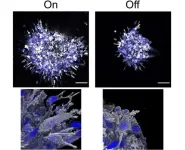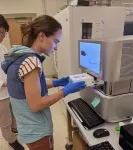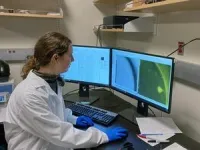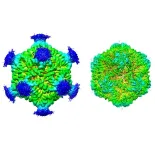Treatment of aggressive breast cancer: discovery of a new protein involved in the development of metastases
2024-01-31
(Press-News.org)
A protein found abundantly in breast cancers that are refractory to conventional treatments is thought to cause the development of metastasis. Targeting it would prevent metastatic spread and therefore increase patients survival. These are the findings of a study conducted by a French-American team and led by a biologist at CNRS1. The study, the results of which appear on 31st January in Cell Discovery, aims to better understand the mechanisms at play in the development of primary tumours in aggressive breast cancers into metastases2.
Malignant cells are thought to spread thanks to the SMYD2 protein, which diverts the activity of another protein — BCAR3 — to the cells’ advantage. Known to be partly responsible for the adhesion and migration capacity of metastatic cancer cells, BCAR3 activity is heavily stimulated by SMYD2. In vitro experiments show that the development of these cells and their ability to migrate and invade surrounding tissues requires the presence and activity of SMYD2.
The team of scientists subsequently attempted to inhibit SMYD2 in mice with primary-stage breast cancer. A comparative analysis of the development of a cancer in treated and untreated mice revealed a correlation between SMYD2 inhibition, the blocking of its action on BCAR3 and the absence of metastasis.
These results are a compelling first step towards the development of an early treatment to prevent the development of metastases in breast cancer. Such a preventive treatment would give the medical team more time to identify and implement effective therapy to treat the primary tumour, or to find an alternative for refractory tumours.
1 Institute for Advanced Biosciences, Grenoble (CNRS/Université Grenoble Alpes/INSERM)
2 Tumours formed by the spread of the primary tumour and invasion of the patient’s other organs.
END
ELSE PRESS RELEASES FROM THIS DATE:
2024-01-31
About The Study: In this analysis using data from the 2019 Global Burden of Disease study, there was a high prevalence of mental disorders affecting children and youths, indicating that more than 1 of 10 (or 293 million) individuals ages 5 to 24 globally live with a diagnosable mental disorder. In terms of burden, around one-fifth of all disease-related disability (considering all causes) was attributable to mental disorders among this population. Additionally, this age period encompasses about one-fourth of the mental disorder burden across the entire life course.
Authors: Christian Kieling, M.D., Ph.D., of the Universidade ...
2024-01-31
RICHMOND, Va. (Jan. 31, 2024) – As many as 10% of older U.S. veterans diagnosed with dementia may suffer instead from reversible cognitive decline caused by advanced liver disease, according to an analysis from the Virginia Commonwealth University’s School of Medicine and the Richmond VA Medical Center.
It can be difficult for physicians to differentiate dementia from the cognitive decline caused by cirrhosis, called hepatic encephalopathy. If undetected, patients may not receive appropriate treatment that can reverse or halt the impairment. ...
2024-01-31
About The Study: Participation in leisure-time physical activity at the recommended level or above was associated with lower odds of both non-injurious and injurious falls in this study of 7,100 older women. Brisk walking and both moderate and moderate-vigorous leisure-time physical activity were associated with lower odds of non-injurious falls.
Authors: Wing S. Kwok, B.App.Sc., of the University of Sydney in Sydney, Australia, is the corresponding author.
To access the embargoed study: Visit our For The Media website ...
2024-01-31
Researchers from the Oxford Martin Programme on the Future of Plastics, University of Oxford, have outlined ambitious targets to help deliver a sustainable and net zero plastic economy. In a paper published in Nature, the authors argue for a rethinking of the technical, economic, and policy paradigms that have entrenched the status-quo, one of rising carbon emissions and uncontrolled pollution.
Currently the global plastics system results in over 1 gigatonnes per annum (Gt/annum) of carbon dioxide equivalent emissions which is the same as the total combined emissions ...
2024-01-31
New Haven, Conn. — Treatment with a molecule known as A485 can quickly and temporarily increase levels of white blood cells, a critical part of the body’s immune system, an effect that is difficult to deliver with currently available pharmaceuticals, a new Yale study finds.
In an experiment, the researchers found that exposure to the molecule in mice caused white blood cells to mobilize from the bone marrow, a response that could inform future treatment for patients who need a boost in immune activity, the researchers say.
The findings were reported Jan. 31 in the journal ...
2024-01-31
Unexpected findings have emerged about how and when certain infection-killing white blood cells decide to form memories about their encounters with a pathogen.
It has been known for decades that these cells can turn themselves into durable memory cells that can survive a long time after an initial infection is cleared. They are prepared to quickly recognize and eliminate future intrusions by the same kind of pathogen.
That is one reason people are resistant to some infectious diseases after exposure to or recovery from the illness. Vaccinations also work this ...
2024-01-31
(Boston)—Significant bleeding due to traumatic injury is the number one cause of preventable deaths in the U.S., with the majority of deaths occurring within six hours. Emerging evidence suggests that the transfusion of whole blood (blood that is not separated into parts) is associated with a survival benefit compared to the traditional use of blood component transfusion (red blood cells, plasma, and platelets) in these patients.
A new study from researchers from Boston University Chobanian & Avedisian School of ...
2024-01-31
FOR IMMEDIATE RELEASE
A combination of two cancer drugs could be effective against malignant peripheral nerve sheath tumors (MPNSTs) — soft tissue tumors that are stubbornly resistant to chemotherapy and radiation — according to a laboratory study led by researchers at the Johns Hopkins Kimmel Cancer Center.
Both drugs interfere with cell growth and replication but have different mechanisms of action. Used together, they suppressed the growth of MPNSTs in mouse models of human disease, the researchers found. The findings were published ...
2024-01-31
Harmful emissions from the industrial sector could be reduced by up to 85% across the world, according to new research.
The sector, which includes iron and steel, chemicals, cement, and food and drink, emits around a quarter of global greenhouse gas (GHG) emissions - planet-warming gases that result in climate change and extreme weather.
This new study, led by the University of Leeds as part of its contribution to the UK Energy Research Centre (UKERC), found that decarbonising the sector is technically possible with a mix of “high and low-maturity” technologies - those that are tried and tested, along with upcoming tech that is not yet ready to be used in industry.
Lead ...
2024-01-31
In a rare but serious complication of cancer, the body’s own immune system can start attacking the brain, causing rapid-onset memory loss and cognitive deficits. What triggers this sudden biological civil war was largely unknown.
Now, researchers at University of Utah Health have found that some tumors can release a protein that looks like a virus, kickstarting an out-of-control immune reaction that may damage brain cells.
Their findings published in Cell on Jan. 31, 2024.
A rapid immune attack
Jason Shepherd, Ph.D., associate ...
LAST 30 PRESS RELEASES:
[Press-News.org] Treatment of aggressive breast cancer: discovery of a new protein involved in the development of metastases





